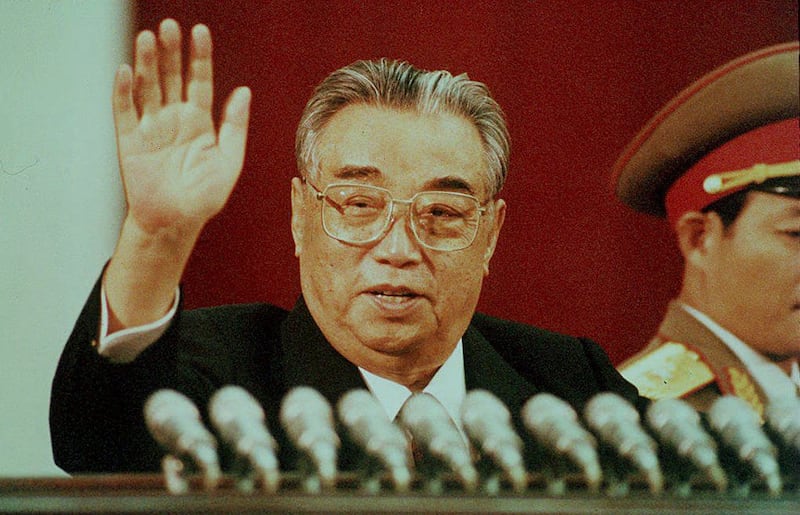“Our general is the wisest of 10 million. Our general cultivates the best paradise with the power of love for our everlasting happiness. His name is General Kim Jong Un!”
So goes the second verse of a song that praises the North Korean leader that is now mandatory for everyone to sing before every social event, residents told Radio Free Asia.
The “Hymn of General Kim Jong Un” will replace the “Hymn of General Kim Jong Il,” the current leader’s father and predecessor. That song had been in use since 1997 when it replaced the “Hymn of General Kim Il Sung,” the progenitor of the three-generation Kim dynasty.
The move to praise the third-generational leader instead of the first or second is an attempt to solidify loyalty around himself by breaking out of his grandfather and father’s shadows, a former high-ranking North Korean official who settled in South Korea in 2019, told RFA Korean on condition of anonymity for safety reasons.
“Since Kim Jong Un has been in power for over 10 years, we cannot continue to live under Kim Il Sung and Kim Jong Il,” the former official said. “Though they are considered … the origin of revolutionary ideology, that entity must be upheld now by Kim Jong Un.”
‘Ascended the throne’
Orders to change the songs went out this month, a resident from the northeastern province of North Hamgyong told RFA Korean on condition of anonymity for safety reasons.
“Kim Jong Un, ascended to the throne in a hereditary succession as a 27-year-old following the death of his father in 2011,” the resident said. “He had us starting events with songs about his ancestors even after 10 years in power, [because at first] he had no political base … and wanted to emphasize the legitimacy of his succession.”
Along with starting events with the “Hymn of Kim Jong Un,” citizens will be required to end events with another song, “We Will Defend General Kim Jong Un at the Cost of Our Lives,” he said.

Both songs are not new, according to the resident.
The hymn was first performed in 2015 by the army during celebrations for the holiday North Korea calls Victory Day, the anniversary of the 1953 signing of the armistice that ended hostilities in the 1950-53 Korean War. The song about defending the leader was first performed on stage in 2012, shortly after Kim Jong Un took power.
The resident said that in the years preceding Kim Il Sung’s death in 1994, the people were made to sing songs praising both Kim Il Sung and his heir, Kim Jong Il. Once the younger Kim took over, the songs praising only Kim Il Sung had been continuously used until three years after he died. Kim Jong Il then replaced them with the songs praising himself.
‘Mixed reactions’
Though it took 10 years for Kim Jong Un to do the same for himself, the move was expected, a resident from the northwestern province of North Pyongan told RFA on condition of anonymity for security reasons.
“When the event song changed, residents showed mixed reactions,” he said. “While they accept this as an expected procedure since he is a hereditary leader, they still react harshly, because asking residents to sacrifice their lives for Kim Jong Un, the leader who caused the current severe food shortage, is an outrage.”
Complaints about the new songs are many, the second resident said.
“Most people cannot accept the propaganda which idolizes [the leader] and forces us to praise the ‘mighty spirit of Korea’ and ‘the dazzling sun of the century,’” he said – a possible link back to grandfather Kim Il Sung, who is often referred to as “the Sun” in propaganda, including the major holiday dedicated to him, the April 15 Day of the Sun.
“Residents are struggling with more severe living difficulties than during the Kim Il Sung and Kim Jong Il eras,” he said. “However we are told to praise [Kim Jong Un] and defend him with our lives. It’s simply too hard to believe.”
Brainwashing
But the former official said he was saddened that residents have no choice but to comply with the government’s orders to praise Kim Jong Un.
“From the perspective of society and residents, they must comply because they continue to receive brainwashing education from the time when they first open their eyes after birth until they grow old and die,” he said.
“In their minds, they may be thinking, ‘What is the government doing and what is the leader doing when we live poor like this?’ Still, it is a strangely rigid consciousness that must be followed as instructed by the party.”
A former North Korean official who settled in South Korea in the mid-2010s said that the change in song goes beyond merely escaping previous leaders’ shadows.
“It seems an effort to break the link between Kim Il Sung and Kim Jong Il and highlight Kim Jong Un as the only great leader,” he said.
Translated by Claire Shinyoung Oh Lee. Edited by Eugene Whong and Malcolm Foster.
